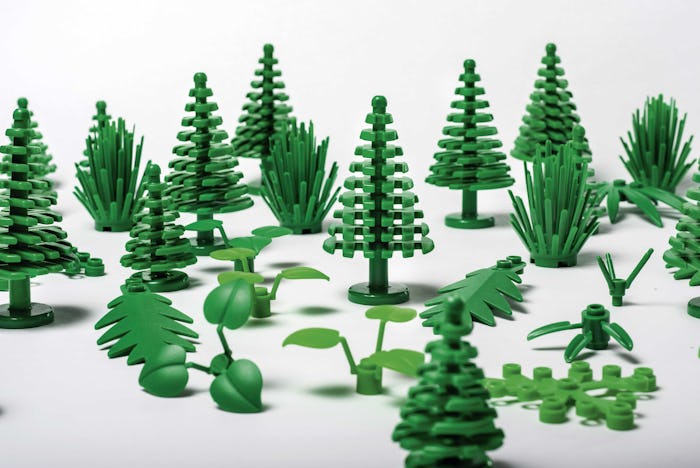In case you were looking for another excuse to buy a child in your life LEGOs so you can secretly play with them, you're in luck. The toy brand just took an important step towards making its products more sustainable: LEGO has started using plant-based plastic sourced from sugarcane to make some of its products. The items getting the plant-based makeover are pretty apropos: LEGO's botanical elements, which include trees, leaves, and bushes. The items are scheduled to appear on shelves sometime this year.
The company announced the news in a press release on its website on Thursday, March 1. “At the LEGO Group we want to make a positive impact on the world around us, and are working hard to make great play products for children using sustainable materials," Tim Brooks, Vice President, Environmental Responsibility at the LEGO Group, said in a statement in the press release:
We are proud that the first LEGO elements made from sustainably sourced plastic are in production and will be in LEGO boxes this year. This is a great first step in our ambitious commitment of making all LEGO bricks using sustainable materials.
The new plant-based LEGOs will be compatible with all other LEGO bricks, and they will look and feel like them, too. “Children and parents will not notice any difference in the quality or appearance of the new elements, because plant-based polyethylene has the same properties as conventional polyethylene,” Brooks added.
The move is part of an initiative set up back in 2015, when the LEGO Group announced that it was investing 1 billion Danish Krone (approximately $163,490,000) to establish the Sustainable Materials Centre. At the time, the group set a goal to develop sustainable, zero-waste alternatives for all of its products and packaging by 2030. The goal is lofty, considering the fact that pretty much all LEGO products are made of plastic.
As explained by Environmental Health News, plastic is a synthetic material derived from oil, and it has a negative impact on the environment in a number of ways, such as polluting and poisoning marine life and wildlife. It's great that LEGO has chosen to acknowledge the problem and that the company is taking tangible steps toward lessening its environmental footprint.
The LEGO Group seems to have gone through all the right channels to make sure the new product lives up to high environmental standards. The company worked with the Bioplastic Feedstock Alliance for guidance on sourcing the sugarcane, which was certified sustainable by the Bonsucro Chain of Custody. Additionally, LEGO is also a partner of World Wildlife Fund for Nature (WWF). “It is essential that companies in each industry find ways to responsibly source their product materials and help ensure a future where people, nature, and the economy thrive,” Alix Grabowski, a senior program officer at WWF, said in a statement shared in LEGO's press release:
The LEGO Group’s decision to pursue sustainably sourced bio-based plastics represents an incredible opportunity to reduce dependence on finite resources, and their work with the Bioplastic Feedstock Alliance will allow them to connect with other companies to continue to think creatively about sustainability.
Through the partnership with WWF, LEGO has made several other steps toward lessening the company's environmental impact, including investing in renewable energy, replacing some plastic packaging with paper packaging, and decreasing the size of some LEGO boxes. All plastic LEGO products are actually recyclable with household plastic, LEGO's website stated, as they're made with a pretty standard type of plastic. The new plant-based LEGO pieces are also recyclable with household plastic. Bogdan Gherasim, Manager of Corporate Communications for LEGO, wrote to Romper in an email:
When it comes to brick recycling, what we recommend if you've finished playing with your LEGO bricks, is that you pass them on to someone else or donate them to other children so they can also enjoy playing with them. If your bricks are worn and no longer suitable for play, they can be recycled (many recycling facilities accept them as "other plastic"). As the new plant-based elements meet the same high standards for quality, safety and durability that our consumers expect from LEGO elements, same applies for these as for our other LEGO bricks.
The new plant-based LEGOs are a great opportunity to teach kids about the importance of sustainability — while parents are building something awesome with them, of course.
Update: This story has been updated with a comment from Bogdan Gherasim from LEGO.
Check out Romper's new video series, Bearing The Motherload, where disagreeing parents from different sides of an issue sit down with a mediator and talk about how to support (and not judge) each other’s parenting perspectives. New episodes air Mondays on Facebook.
